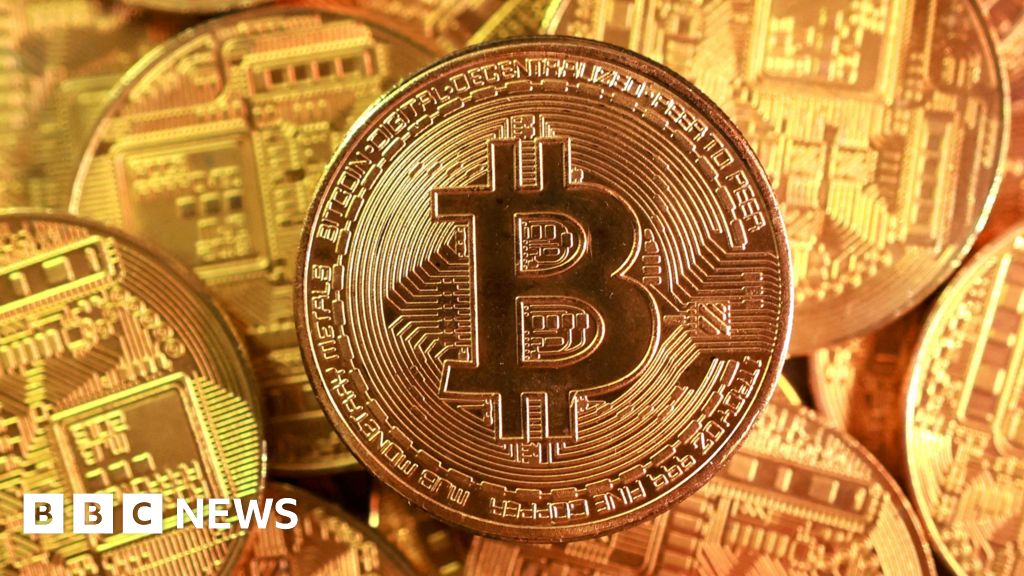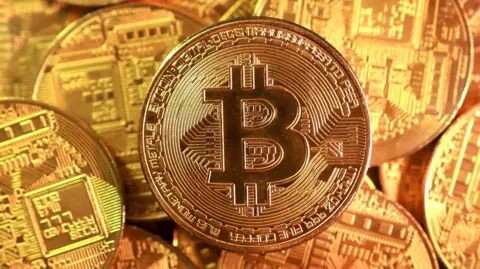Business
Bitcoin worth $14bn seized in US-UK crackdown on alleged scammers

Lauren Turner and
Osmond Chia
 Reuters
ReutersThe US government has seized more than $14bn (£10.5bn) in bitcoin and charged the founder of a Cambodian business empire, Prince Group, with allegedly masterminding a massive cryptocurrency scam.
UK and Cambodian national Chen Zhi was charged on Tuesday in New York for allegedly engaging in a wire-fraud conspiracy and running a money laundering scheme.
Mr Chen’s businesses were also sanctioned by the US and the UK as part of a joint operation. The UK government says it has frozen assets owned by his network, including 19 properties in London – one of which is worth nearly £100m ($133m).
The BBC has contacted the Prince Group for comment.
US prosecutors say it is one the biggest financial takedowns in history and the largest ever seizure of bitcoin, with approximately 127,271 bitcoin being held by US government.
Mr Chen, who remains at large, is accused of being the mastermind behind a “sprawling cyber-fraud empire” operating under his multi-national company, the Prince Group, said the US Department of Justice (DOJ).
The Cambodia-based group’s website says its businesses include property development, and financial and consumer services. But the DOJ alleges that it runs one of Asia’s largest transnational criminal organisations.
Unwitting victims were contacted online and convinced to transfer cryptocurrency based on false promises that the funds would be invested and generate profits, the DOJ said.
Prosecutors alleged that the company, under Mr Chen’s direction, built and operated at least ten scam compounds throughout Cambodia, according to court documents seen by the BBC.
Mr Chen was accused of managing the compounds that were specially designed to reach as many victims as possible, said prosecutors.
His accomplices allegedly procured millions of mobile phone numbers and set up “phone farms” to conduct call centre scams, according to the court documents, dated 8 October.
Two of these facilities had 1,250 mobile phones that controlled around 76,000 social media accounts for scams, the documents said.
Prosecutors said Prince Group documents included tips on building rapport with victims, advising workers not to use profile photos of women who were “too beautiful” so that the accounts would look more genuine.
 US District Court EDNY
US District Court EDNYAssistant Attorney General for National Security John A Eisenberg described the Prince Group as a “criminal enterprise built on human suffering”.
It also trafficked workers, who were confined in prison-like compounds and forced to carry out scams online, targeting thousands of victims worldwide, he said.
Mr Chen and his accomplices allegedly used the criminal proceeds for luxury travel and entertainment, said the DOJ.
They also made “extravagant” purchases like watches, private jets and rare artwork, including a Picasso painting purchases from a New York City auction house, the department said.
If convicted, Mr Chen faces a maximum penalty of 40 years in jail.
In Britain, Mr Chen and his accomplices allegedly incorporated businesses in the British Virgin Islands and invested in UK property. His network’s assets include a £100m office building on central London, a £12m mansion in North London and seventeen flats in the city, said the UK foreign office on Tuesday.
Being sanctioned, as part of a joint operation with US authorities, means he is now locked out of the UK’s financial system.
The Prince Group has also been sanctioned in the US and labelled as a criminal organisation.
They were “ruining the lives of vulnerable people and buying up London homes to store their money”, UK Foreign Secretary Yvette Cooper said.
Cooper said: “Together with our US allies, we are taking decisive action to combat the growing transnational threat posed by this network – upholding human rights, protecting British nationals and keeping dirty money off our streets.”
The foreign office said Mr Chen and the Prince Group built casinos and compounds used as scam centres and laundered the proceeds.
Four businesses linked to the alleged scams – The Prince Group, Jin Bei Group, Golden Fortune Resorts World and Byex Exchange – have also been sanctioned, said the foreign office.
Two scam centres allegedly run by Jin Bei Group and Golden Fortune Resorts were named earlier this year in an Amnesty International report on the use of forced labour and torture in Cambodian scam centres.
People working in scam centres are often foreign nationals lured by the promise of a legitimate job, and then forced to carry out scams under threat of torture, the foreign office said.
These scammers operate on an “industrial scale”, including in the UK, using tricks like fake romantic relationships to lure victims into being scammed, said the foreign office.
Fraud Minister Lord Hanson said: “Fraudsters prey on the most vulnerable by stealing life savings, ruining trust, and devastating lives. We will not tolerate this.”
Business
Gurugram Attracts Rs 86,588 Crore In Real Estate Investments In 2025 As RERA Clears 131 Projects

Last Updated:
Alongside rising investments, Gurugram RERA strengthened regulatory oversight to safeguard homebuyer and investor interests

Gurgaon Real Estate (Representative Image)
Gurugram emerged as one of India’s top real estate investment destinations in 2025, with projects worth Rs 86,588 crore receiving regulatory approvals during the year, according to data from the Gurugram Real Estate Regulatory Authority (Gurugram RERA).
Market observers said the numbers reflect strong investor confidence in the NCR’s largest commercial and residential hub.
Gurugram RERA registered 131 projects in calendar year 2025, representing development potential of 35,455 units across housing and commercial segments.
A striking feature of the data was the dominance of large-ticket projects. Just 28 major developments accounted for investments worth Rs 59,360 crore, highlighting the growing influence of institutional capital and large developers in shaping Gurugram’s property market.
Residential assets continued to attract the bulk of investment interest. Of the total units approved, 31,455 were residential, underscoring sustained end-user demand and long-term confidence in the city’s housing fundamentals.
According to Authority data, the residential mix included 17,405 group housing units, 5,720 mixed land use units, 4,040 residential floor units, 2,122 affordable group housing units, 1,954 units under the Deen Dayal housing scheme, and 214 residential plotted colony units.
Market observers said this diversified supply pipeline indicates capital deployment across both premium and mass segments, helping reduce concentration risk and deepen market resilience.
On the commercial side, Gurugram RERA approved about 4,000 commercial units, of which 168 were dedicated to IT parks, reinforcing Gurugram’s position as a preferred hub for technology firms and Global Capability Centres.
Analysts noted that the combination of office-led employment growth and residential expansion continues to make Gurugram attractive for long-term capital deployment.
Industry experts said the scale of investments approved in 2025 highlights Gurugram’s ability to attract capital despite global uncertainty, supported by infrastructure growth, a strong corporate base and an improving regulatory environment.
“With a large pipeline of approved projects and sustained interest from developers and institutional investors, Gurugram is expected to remain a key real estate investment destination in the coming years,” a Gurugram-based real estate expert said.
Tighter regulatory checks
Alongside rising investments, Gurugram RERA strengthened regulatory oversight to enhance transparency and safeguard homebuyer and investor interests.
“These steps included stricter scrutiny of developer submissions, mandatory site inspections by domain experts, and public consultation through mandatory notices before project registration,” an Authority official said.
January 16, 2026, 07:44 IST
Read More
Business
National Startup Day 2026: How India’s Startups Are Shaping The Future

Last Updated:
National Startup Day highlights India’s thriving startup ecosystem, celebrating innovation, entrepreneurship and job creation driven by founders, unicorns and Startup India mission

National Startup Day 2026 honours Indian startups, entrepreneurs and innovators driving economic growth and job creation.
National Startup Day 2026: India’s startup ecosystem has evolved into one of the world’s most vibrant and promising innovation hubs. To recognise the contribution of entrepreneurs, founders and startups transforming ideas into impactful solutions, National Startup Day is observed every year on January 16 across the country.
Launched by Prime Minister Narendra Modi in 2022, the day celebrates visionary entrepreneurs who play a crucial role in economic growth, employment generation and technological advancement.
National Startup Day serves as a reminder that innovation, backed by determination and policy support, can reshape society and create global impact.
National Startup Day 2026 Theme
The official theme for National Startup Day 2026 is yet to be announced. However, the core focus areas are expected to revolve around:
- Innovation and emerging technologies
- Entrepreneurship and leadership
- Self-reliance (Atmanirbhar Bharat)
- Startup India Mission
- Youth empowerment
- Job creation
How Startups Are Shaping India’s Future
India currently ranks as the third-largest startup ecosystem globally, with over 1.59 lakh startups recognised by the Department for Promotion of Industry and Internal Trade (DPIIT) as of early 2025. Backed by 100+ unicorns, the ecosystem continues to grow rapidly.
Metro cities such as Bengaluru, Hyderabad, Mumbai and Delhi-NCR lead this expansion, while Tier-2 and Tier-3 cities are emerging as new innovation centres, adding diversity and scale to India’s entrepreneurial journey.
Startups across fintech, edtech, health-tech, e-commerce and deep-tech are addressing real-world challenges and gaining global recognition. Technologies like artificial intelligence, blockchain and IoT are increasingly driving innovation, according to Startup India ecosystem reports.
Industry-Wise Startup Impact
DPIIT-recognised startups have generated over 16.6 lakh direct jobs across sectors as of October 31, 2024, strengthening India’s employment landscape.
- IT Services: 2.04 lakh jobs
- Healthcare & Life Sciences: 1.47 lakh jobs
- Commercial & Professional Services: 94,000 jobs
Through the Startup India initiative, the government continues to focus on skill development, funding access, ecosystem collaboration and global outreach.
Key Initiatives Under Startup India
- Capacity building and mentorship
- Outreach and awareness programmes
- Ecosystem development events
- International exposure and global linkages
- Collaboration between startups, corporates and institutions.
January 16, 2026, 07:00 IST
Read More
Business
Govt keeps petrol, diesel prices unchanged for coming fortnight – SUCH TV

The government on Thursday kept petrol and high-speed diesel (HSD) prices unchanged at Rs253.17 per litre and Rs257.08 per litre respectively, for the coming fortnight, starting from January 16.
This decision was notified in a press release issued by the Petroleum Division.
Earlier, it was expected that the prices of all petroleum products would go down by up to Rs4.50 per litre (over 1pc each) today in view of variation in the international market.
Petrol is primarily used in private transport, small vehicles, rickshaws, and two-wheelers, and directly impacts the budgets of the middle and lower-middle classes.
Meanwhile, most of the transport sector runs on HSD. Its price is considered inflationary, as it is mostly used in heavy transport vehicles, trains, and agricultural engines such as trucks, buses, tractors, tube wells, and threshers, and particularly adds to the prices of vegetables and other eatables.
The government is currently charging about Rs100 per litre on petrol and about Rs97 per litre on diesel.
-

 Politics1 week ago
Politics1 week agoUK says provided assistance in US-led tanker seizure
-

 Entertainment1 week ago
Entertainment1 week agoDoes new US food pyramid put too much steak on your plate?
-

 Entertainment1 week ago
Entertainment1 week agoWhy did Nick Reiner’s lawyer Alan Jackson withdraw from case?
-

 Business1 week ago
Business1 week agoTrump moves to ban home purchases by institutional investors
-

 Sports5 days ago
Sports5 days agoClock is ticking for Frank at Spurs, with dwindling evidence he deserves extra time
-

 Sports1 week ago
Sports1 week agoPGA of America CEO steps down after one year to take care of mother and mother-in-law
-

 Tech3 days ago
Tech3 days agoNew Proposed Legislation Would Let Self-Driving Cars Operate in New York State
-

 Business1 week ago
Business1 week agoBulls dominate as KSE-100 breaks past 186,000 mark – SUCH TV






